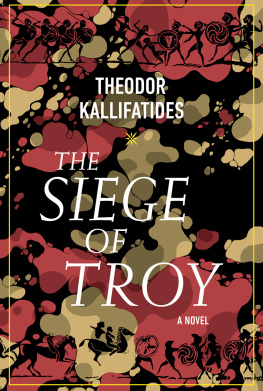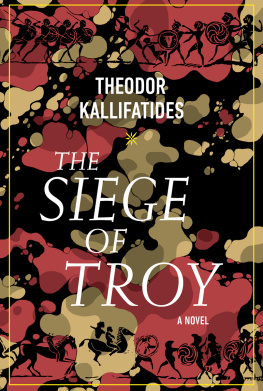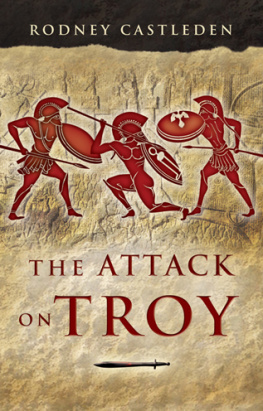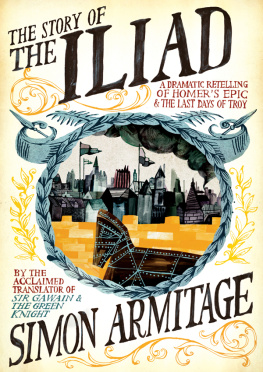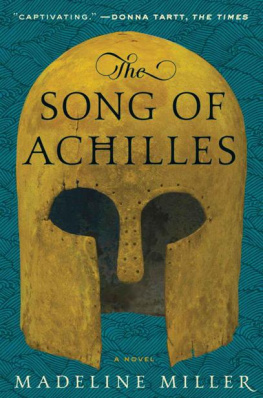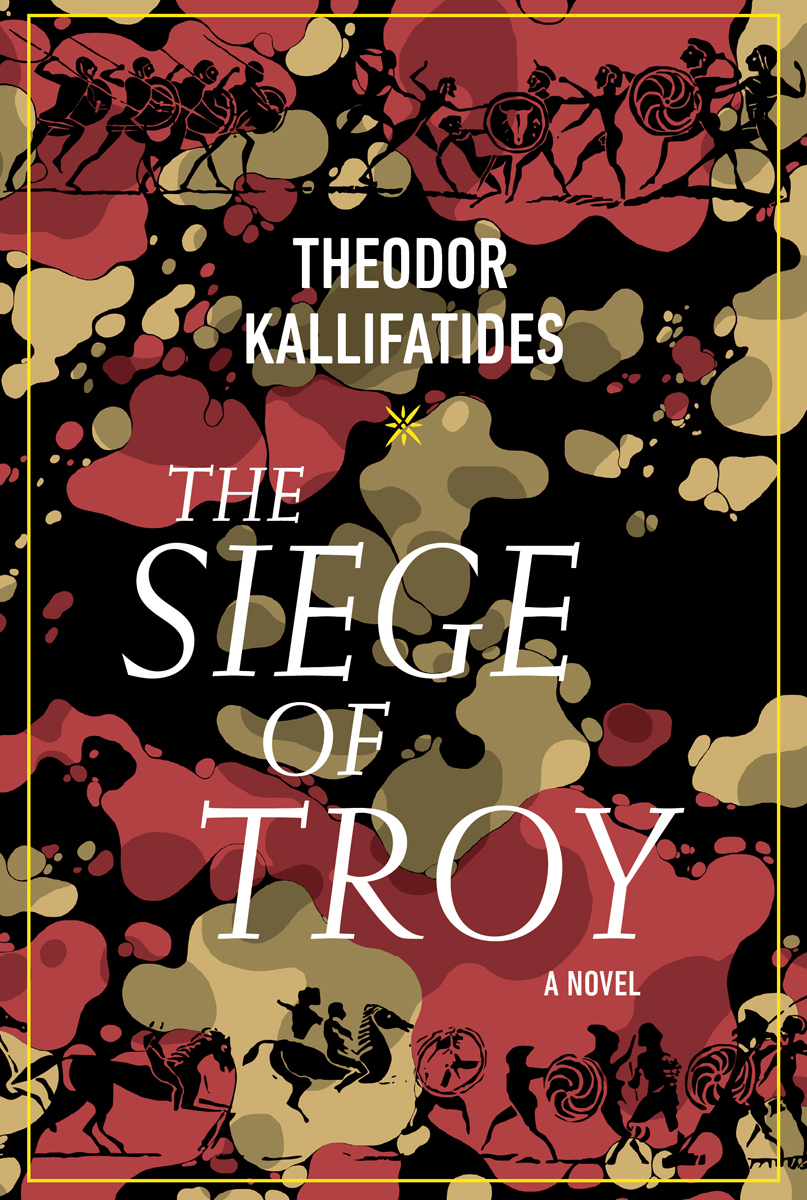Contents
Landmarks
Print Page List
ALSO BY THEODOR KALLIFATIDES
Another Life: On Memory, Language,
Love, and the Passage of Time
Copyright 2018 Theodor Kallifatides
Originally published in Swedish as Slaget om Troja in 2018
by Albert Bonniers Frlag, Stockholm
Translation copyright 2019 Other Press
The cost of this translation was supported by a grant from the Swedish Arts Council.
Production editor: Yvonne E. Crdenas
Text designer: Jennifer Daddio / Bookmark Design & Media Inc.
All rights reserved. No part of this publication may be reproduced or transmitted in any form or by any means, electronic or mechanical, including photocopying, recording, or by any information storage and retrieval system, without written permission from Other Press LLC, except in the case of brief quotations in reviews for inclusion in a magazine, newspaper, or broadcast. For information write to Other Press LLC, 267 Fifth Avenue, 6th Floor, New York, NY 10016.
Or visit our Web site: www.otherpress.com
The Library of Congress has cataloged the printed edition as follows:
Names: Kallifatides, Theodor, 1938 author. | Delargy, Marlaine, translator.
Title: The siege of Troy / Theodor Kallifatides ; translated from the Swedish by Marlaine Delargy.
Other titles: Slaget om Troja. English
Description: New York : Other Press, 2019.
Identifiers: LCCN 2018059179 (print) | LCCN 2019000756 (ebook) | ISBN 9781590519721 (ebook) | ISBN 9781590519714 (hardcover)
Subjects: LCSH: Troy (Extinct city)Fiction.
Classification: LCC PT9876.21.A45 (ebook) | LCC PT9876.21.A45 S58513 2019 (print) | DDC 839.73/74dc23
LC record available at https://lccn.loc.gov/2018059179
Ebook ISBN9781590519721
Publishers Note
This is a work of fiction. Names, characters, places, and incidents either are the product of the authors imagination or are used fictitiously, and any resemblance to actual persons, living or dead, events, or locales is entirely coincidental.
v5.4
a
Contents
I WAS FIFTEEN YEARS OLD and in love with my teacher. The year was 1945, and it was the beginning of April. My village had been occupiedas had the whole of Greeceby the German army since 1941. The school didnt function at all during those years. The two teachers had been taken away by the Germans, and no replacements arrived. One of those teachers was my father. We didnt know if he was alive, or already dead. Mom cried at night and took care of me and our home during the day. It was just the two of us. Mom and me.
A retired lawyer sometimes gave lessons in history and Greek. Not in the school; the Germans had turned it into a barracks. We would occasionally gather at his house, but more often at his caf in the square in the afternoons, as the lawyer tried to revive himself with several cups of coffee after his siesta. He drank them heavy, without bubbles, which means without sugar and well stirred. Its not easy to say what we learned during those lessons, although we did become particularly adept at card games.
Miss arrived on one such afternoon, on the bus from Athens. The mayor came to meet her. She was a young woman, as thin as a strip of light, even though she was dressed in black from top to toe. I fell in love immediately, however weird that sounds. This was our new teacher, which was a good sign. Life would get back to normal again. But not for everyone. For me it meant that Dad would probably never return, and I prepared myself for even more sleepless nights with Mom sobbing in the room next door.
My only consolation was Miss. I never tired of gazing at her. She was small, dark, with burning eyes and beautiful hands, which she liked to move often. Officially we called her Miss, unofficially the Witch, because she could get the villages bad-tempered, cowering dogs to stop barking. Otherwise they would even bark at their own shadow.
It was Dimitra, my childhood playmate, who delivered the diagnosis.
Shes a witch, she said, and that was that.
The year was 1945, as I said. The Second World War was nearing its end, the German army was retreating on all fronts, but we knew nothing about that, and life in the village continued as normal. The German soldiers were no longer so alien, and there were fewer and fewer of them with each passing day. Some were killed fighting the partisans, while others were sent off to the Eastern Front.
With the permission of the German captain, lessons were now held in the school a short distance outside the village. That was where it all began.
It was a sunny day, the windows were open, we could see the German flag fluttering gently in the playful breeze. Miss was in the middle of explaining that transitive verbs require the genitive case, and gave a popular saying as an example: Early each morning the happy housewife busies herself with her home. Her home must therefore be in the genitive case.
Bad example, muttered Dimitra, who had never seen her mom looking happy in the morning. She also detested all rules, particularly grammatical ones.
Handcuffs for the imagination, she called them.
Miss took the opposite view. Her primary duty and pleasure was to teach us our language.
Being Greek means knowing the Greek language, she said.
When we heard the roar of planes, we werent worried. We assumed they were German. There was a temporary airfield in the village, built by the Germans for their transport needs during the Battle of Crete. Both my grandfather and my uncle had been forced to work there, like most local men. My father would have had to do the same, but he was stuck in some prison, if he was still alive.
We were sitting in the classroom when the first bomb fell, making the windows rattle. We were more curious than afraid, and rushed outside to see where it had landed. The first victim was a donkey laden with wood. Her big belly had been split in two, and she lay there kicking all four legs in the air as she slowly died.
The planes were not German. They were British.
The next bomb hit the schools primitive outside toilet, sending turds flying all around us along with dead mice and rats. Miss, who had come out with us, shouted that we must run to the cave if we didnt want to die.
We didnt want to die. The cave lay around a hundred yards from the school, a little way into a ravine that cut through the village. We all knew where it was. We used to play cops and robbers there, among other things, and we would sometimes spy on the courting couples who sought sanctuary inside.
The class consisted of six boys and just one girlDimitra. Seven of us. A good number, Miss said. God created the world in seven days.
So there were the seven of us plus Miss in the cave. It was cramped, dark, damp, and crawling with all kinds of bugs. We huddled close together. I sat right next to Dimitra. Miss went and stood in front of us in the opening to the cave; the light from outside fell on her, and she looked like one of the stern angels in the village church.
The bombs continued to fall. We heard explosions, the roar of the planes, the German siren, and then the bell ringer decided to take the opportunity to sound the alarm. He had loved sounding the alarm even before the war, when spontaneous fires would break out in the valley in the summer. His life acquired a meaning, so to speak, even if he went deaf as a result.

